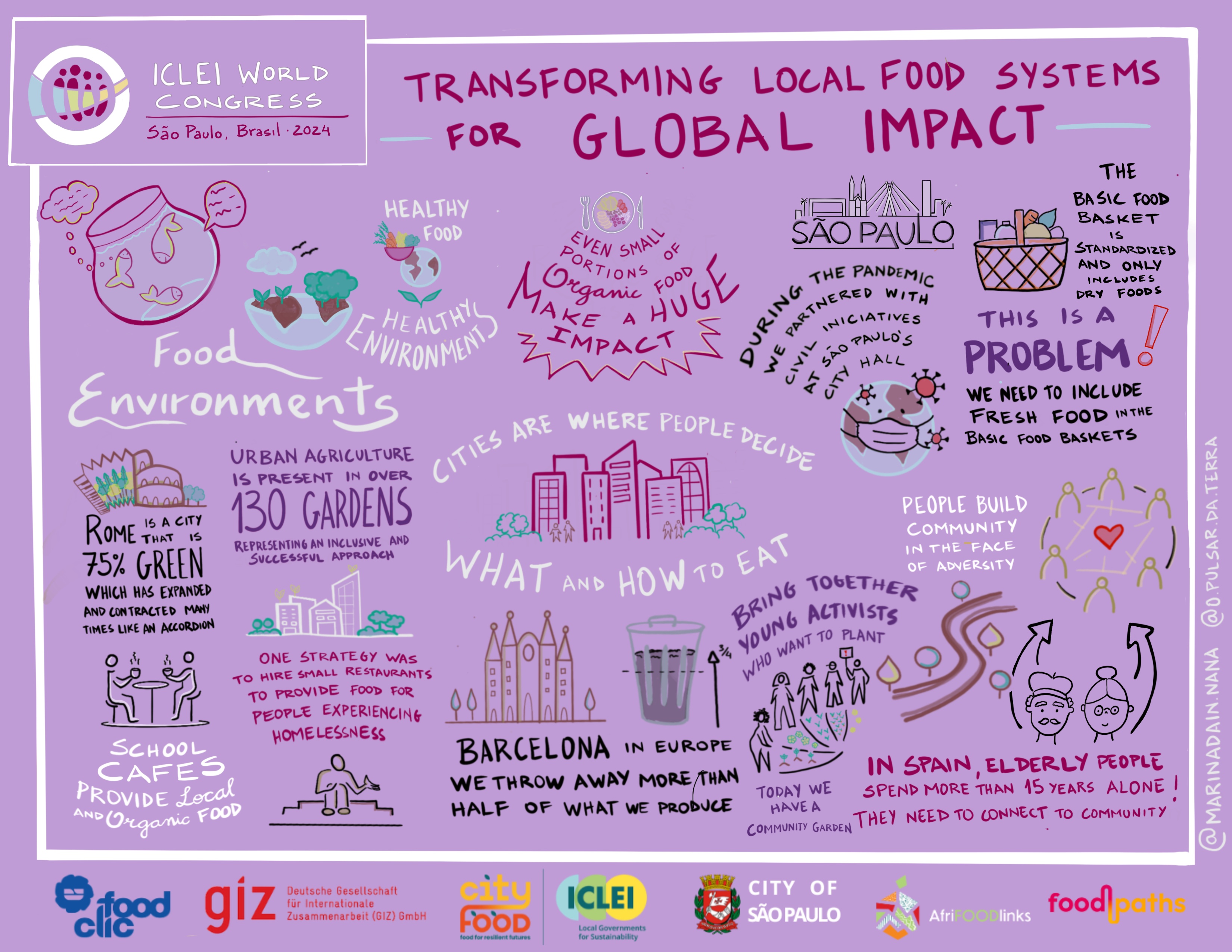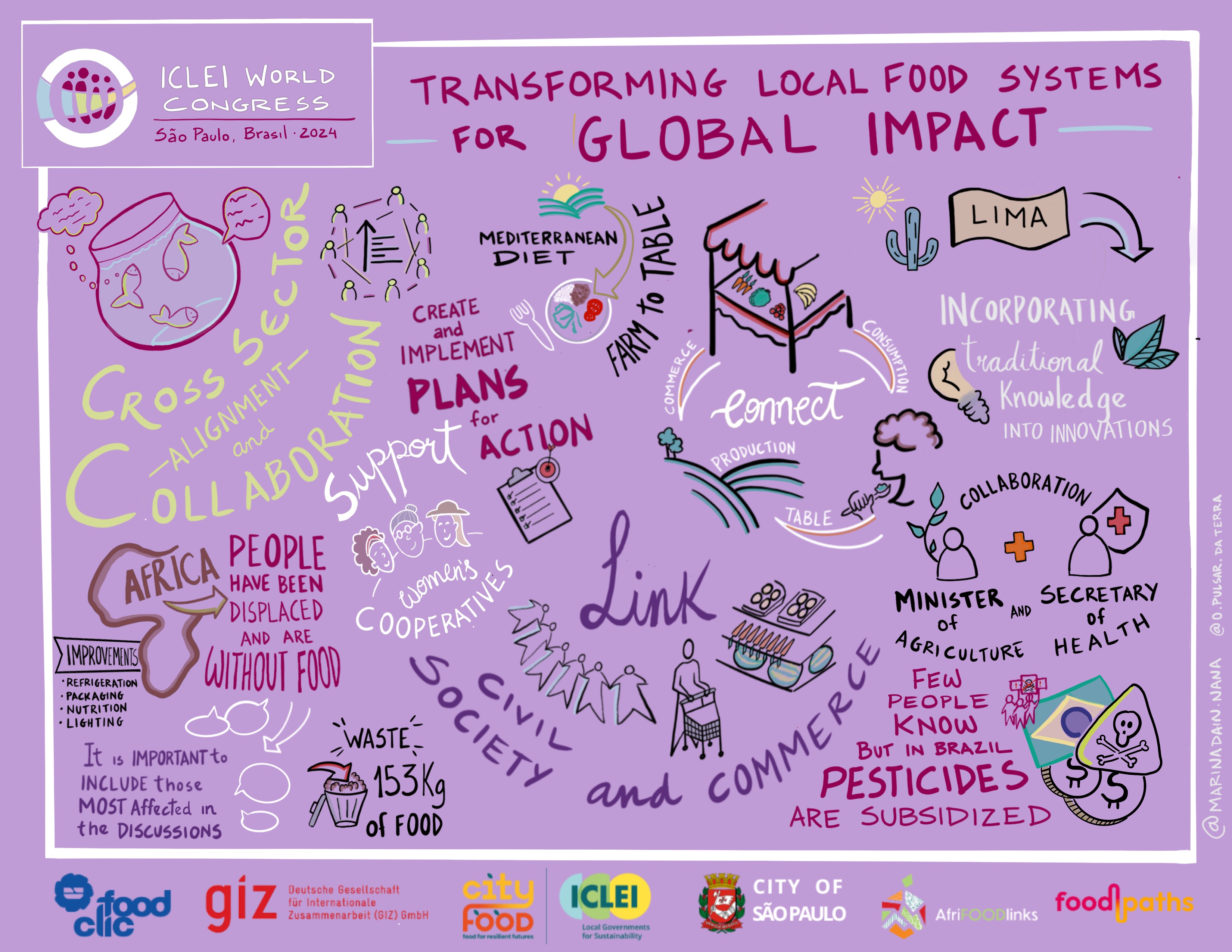
City-regions share insights for food systems transformation at ICLEI’s World Congress 2024
In São Paulo, Brasil, Victor Tenez Ybern, Head of Strategic Planning, Metropolitan Area of Barcelona and representing the Barcelona Living Lab in FoodCLIC joined speakers in ICLEI’s CityFood Program session and shared stories about food systems transformation from local to global - highlighting best practices, learnings, and challenges. At the heart of the session’s discussion were three key ingredients for transforming food systems towards sustainability and resilience: 1) healthy food environments, 2) inclusive governance, and 3) cross-sectoral alignment and collaboration. Participants from Brazil, Spain, Morocco, Italy, Uganda, and beyond participated in a guided discussion. In this news blog we present the three key takeaways.
Food environments

What are they? Food environments are social, spatial, and political areas where food is produced, consumed and disposed of. They are where daily decisions are made about what to eat, where to buy food, when to eat it and who to eat with. They range from hospitality (e.g. restaurants, take-away shops), retail (e.g. supermarkets and fresh food markets), community (e.g. co-ops, gardens), institutional environments (e.g. public canteens, schools), and the wild (e.g. edible landscaping, land left for nature).
Why are they important? Mr. Tenez Ybern emphasized how food environments can build rural-urban linkages. Mr. Tenez Ybern stated that by shortening supply chains, cities support local and regional economic development, enhance social relationships, and have the potential for positive environmental impact. Urban agriculture, for example, does not replace farmers but can make unused public lands available to young farmers.
Inclusive Governance

What is it? Inclusive governance is a collaborative approach involving various food systems actors in addressing and solving complex issues or pursuing common goals. Voices are represented equally, and power-relations are taken into account and diverse groups are brought together to jointly participate in co-creation processes, decision-making, problem-solving, and implementation processes.
What does it look like in practice? Belo Horizonte’s Urban Food Program, one of the first integrated food security policies in the world, has had great successes in this regard. Strong municipal government and civil society leadership paired with national policy, programmatic and financial support, have made it possible for citizens of Belo Horizonte to make the changes they want to see in their community, as voiced by Ana Caetano, the city’s Planning and Management Advisor at Secretary for Food Security.
Cross sectoral alignment and collaboration

What does it involve? Cross sectoral alignment and collaboration breaks down traditional silos and fosters interactions between diverse sectors to leverage their unique strengths and perspectives to address common goals (e.g. spatial planning, mobility, climate, housing, circular economy, health) and to achieve co-benefits through the mainstreaming of cross-sectoral topics and food-related priorities.
How does it happen? Food policy councils and multi-stakeholder groups actively work to bring diverse stakeholders together to ensure healthy people, healthy landscapes and a healthy planet.
"Things on paper look pretty but the challenge is to make that on the paper concrete. At the same time, we can’t make it concrete if we don’t write it down. Sao Paulo engaged organizations in all shapes and sizes when we prepared our food strategies. This is because if we don’t have the people on board, especially those most vulnerable, our work won’t be concrete enough since it cannot serve the communities that we are actually targeting." Soninha Francine, Secretary of Human Rights, São Paulo, Brazil
This session illustrated the importance of food environments, inclusive governance, and cross-sectoral collaboration. These priorities are shared by consortium members of FoodCLIC, FoodPaths, GIZ Transformative Initiative on Fresh Food Markets, and AfriFOODlinks. Food systems are highly complex, with strong interdependencies across society, the economy, cultures and landscapes, and thus necessitate concerted efforts and inclusive governance on local, national, regional, and global levels.
Activities such as these can bring cities one step closer to the right to food for all, which has been anchored in the Brazilian constitution since 2010, as described by Soninha Francine – Secretary of Human Rights São Paulo, Brazil. And as Mohamed Sefiani the Mayor Chefchaouen, Morocco said, we are working on food issues to ultimately contribute to our goals of sustainable development. Let’s take these sentiments forward and transfer the learnings from this session to our own activities and communities!
This article has been edited from the original article by ICLEI with permission.
Publishing date:
FOODCLIC. We are connecting people, food, policy & places.
FoodCLIC is a four-year project funded by the EU. The project runs from September 2022 to February 2027. The acronym FoodCLIC stands for 'integrated urban FOOD policies – developing sustainability Co-benefits, spatial Linkages, social Inclusion and sectoral Connections to transform food systems in city-regions

